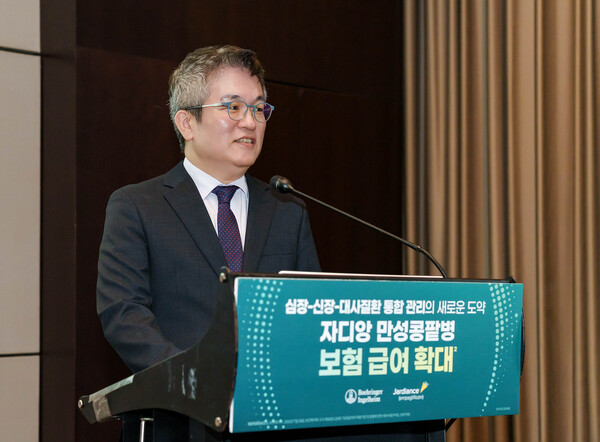Jardiance (ingredient: empagliflozin), Boehringer Ingelheim’s SGLT-2 inhibitor, has become available under Korea’s national health insurance for the treatment of chronic kidney disease (CKD), widening patient access beyond diabetes and heart failure and marking a step forward in integrated cardio-renal-metabolic (CRM) management.
The company announced the reimbursement expansion during a press conference on Tuesday at Conrad Seoul.
Under the Ministry of Health and Welfare’s latest notification, coverage began Aug. 1 for non-diabetic CKD patients who meet specific criteria -- stable use of ACE inhibitors or angiotensin II receptor blockers at the maximum tolerated dose for at least four weeks, an estimated glomerular filtration rate (eGFR) of 20–75 mL/min/1.73㎡, and evidence of proteinuria confirmed by a dipstick test or a urine albumin-to-creatinine ratio (uACR) of 200 mg/g or higher.

Professor Lee Jung-pyo of the Department of Internal Medicine at Seoul National University Borame Medical, who spoke at the event, noted that CKD has steadily increased in prevalence, with cases up nearly 30 percent between 1990 and 2017.
“Because treatment options are limited, patients were already turning to Jardiance before reimbursement was available,” he said. “With insurance now covering the drug, far more patients will be able to benefit.”
Citing the EMPA-KIDNEY trial, Professor Lee highlighted that Jardiance reduced the risk of kidney disease progression or death by 28 percent compared to placebo and halved the rate of decline in kidney function.
The therapy delayed the need for dialysis or transplant by an estimated 26.6 years in early CKD patients. Importantly, benefits were consistent regardless of diabetes status.
“Chronic kidney disease often leads to premature death or end-stage renal failure,” he said. “Jardiance can slow this trajectory and help preserve patients’ quality of life.”
CKD is closely linked to hypertension and diabetes, with one in three diabetic patients and one in five hypertensive patients developing the condition.
Professor Lee explained that the disease cannot be viewed in isolation.
“Diabetes alone shortens life expectancy by six years, but when combined with cardiovascular disease the reduction is 12 years, and with early diabetic kidney disease it is 16 years,” he said. “This demonstrates the need for integrated cardio-renal-metabolic care.”
While the new reimbursement criteria cover the majority of patients,
Professor Lee expressed hope that eligibility would eventually extend to those with milder kidney impairment.
“About 80 percent of CKD patients seen in clinics already meet the criteria,” he said. “But expanding to patients with higher eGFR and significant proteinuria could further broaden access.”
Boehringer Ingelheim Korea Medical Lead Lee Gun-il, expanded on this theme, describing how SGLT-2 inhibitors like Jardiance are positioned as first-line therapies in international guidelines for patients with overlapping cardiovascular, renal, and metabolic risks.
“Globally, over one billion people are affected by these interrelated conditions, and their mortality risk doubles when comorbidities overlap,” he said. “By addressing shared risk factors and pathways, early use of Jardiance can support a holistic management strategy.”
Since the landmark EMPA-REG OUTCOME trial in 2015, Jardiance has demonstrated consistent benefits across more than 200,000 patients, with EMPEROR and EMPA-KIDNEY further validating its use in heart failure and kidney disease.
The International Society of Nephrology’s 2024 guidelines granted empagliflozin a strong Grade 1, Level A recommendation for CKD treatment, reflecting the highest level of clinical evidence.
Ana-Maria Boie, General Manager of Boehringer Ingelheim Korea, emphasized the company’s commitment to advancing integrated care.
“This reimbursement expansion not only improves treatment accessibility but also brings us closer to enhancing quality of life for CKD patients,” she said. “Jardiance will continue to play a central role in transforming cardio-renal-metabolic care in Korea.”
Related articles
- Boehringer’s Jardiance wins insurance coverage for chronic kidney disease in Korea
- Boehringer Ingelheim’s Jardiance gets expanded coverage for HFpEF patients
- SGLT-2 inhibitors’ reimbursement expansion to heart failure patients reignites originality debate
- ‘SGLT-2 inhibitors are not optional but compulsory for chronic kidney disease patients’
- SGLT-2i Jardiance expands indication to treat chronic kidney disease
- High-volume hemodiafiltration emerges as new standard for dialysis
- Nephrology society aims to cut chronic kidney disease by 10% by 2033
- 'Boehringer’s new pulmonary fibrosis therapy shows promise, but access remains key challenge'
- Boehringer scales up fibrosis R&D across ASEAN, Korea, Australia, and NZ
- Expert urges 4.6 million Koreans with chronic kidney disease to break 3 small habits

